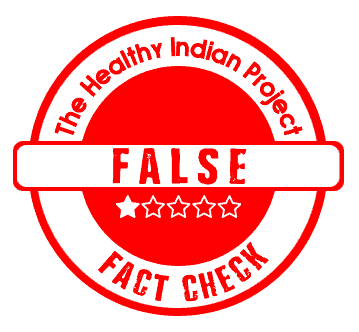Last Updated on April 5, 2024 by Neelam Singh
Quick Take
A social media post that has gone viral raised concerns about the quality of milk, medications, and other products in India. We analysed the claim and found it to be false.

The Claim
A highly shared social media post under the username Curiosweety claims that adulterated medications, milk, and other products—including alcohol—have been marketed in large quantities and for years in India.

We have been diligently sharing information on medications that is supported by evidence. These include those that specify when they should be used, whether they should be taken with or after meals and those that must be taken on an empty stomach.
Fact Check
What does the term ‘adulteration’ mean? In what ways does it pose a threat to food and medicine?
Adulteration refers to intentional alterations made to food quality. This usually means making goods with less-than-ideal, less expensive materials; these modifications might increase the product’s quantity, enhance its appearance, or even deceive consumers. Please be advised that adulteration poses a major risk to the public’s health and safety when it comes to medications and food.
Drug adulteration jeopardises both their security and effectiveness. When necessary, ingredients are swapped out with less costly ones, and the medication’s quality suffers. These adulterants also introduce hazardous substances or pollutants, which may result in unfavourable reactions, treatment failures, or even poisoning.
Adulteration in food products might have serious repercussions. Food adulterants have the potential to be genotoxic, clastogenic, and carcinogenic. These not only reduce the nutritional content but also provide a risk for various health problems, from minor digestive troubles to serious or long-term illnesses. Additionally, contaminated food is deficient in vital nutrients, which has an impact on general health and raises the possibility of malnutrition.
It is crucial to stress that adulteration damages consumer trust and public health. To ensure the integrity and safety of the products, stringent regulations and quality assurance processes have been put in place.
Should we assert that most of the Indian medicines and food items are adulterated?
No, not really. This is a conspiracy theory that the Supreme Court is colluding with multinationals and pharma companies to act against Patanjali, as suggested in the post. Yet, similar to the majority of conspiracy theories, this one is baseless and neither can be validated nor refuted. However, the statement that “adulterated drugs and milk are sold in tonnes” needs to be refuted.
India is a major pharmaceutical exporter. Our vaccines have made a mark. This is explained by India’s stringent licencing requirements for both drugs and food products. This approach ensures that regulatory obligations are fulfilled while safeguarding public health interests. Furthermore, it is critical to emphasise that food and drugs are governed by distinct regulatory agencies.
In India, regulatory bodies like the Central Drugs Standard Control Organisation (CDSCO) regulate drug quality. This organisation monitors licencing, ensures adherence to quality standards, and conducts facility inspections for pharmaceutical manufacturers. Drugs and Cosmetics Act, 1940, one of the most substantial acts of legislation, regulates the production, importation, and distribution of Indian pharmaceuticals.
The Indian government has also implemented several measures to guard against food adulteration and preserve food security in the country. One such crucial move is the establishment of the Food Safety and Standards Authority of India (FSSAI). The FSSAI sets guidelines and regulates food production, storage, distribution, sale, and imports to ensure food product conformance. The FSSAI conducts routine food surveillance, monitoring, inspection, and random sampling. These measures help handle incidents of adulteration.
The Prevention of Food Adulteration Act of 1954 is a key measure for preventing adulteration. This law penalises violators in order to regulate the quality of food. Furthermore, initiatives like the Detect Adulteration with Rapid Test (DART) booklet provide consumers and law enforcement with easy-to-use tests for the prompt identification of common adulterants in food products. These concerted efforts are mostly focused on upholding public health and Indian food quality standards.
In what ways may consumers protect themselves against adulteration?
The government may not have complete control over consumer health and safety, but it may have a significant impact on preventing tainted food and medication. Consumers must be vigilant, informed, and proactive. Consumers can make informed decisions if they are aware of the common adulterants, their impact on health, and, if possible, how to identify them. This could be aided by government-sponsored awareness campaigns and educational programmes.
Additionally, consumers should think about reviewing ingredient lists and labels. This will help identify any potentially harmful additives or pollutants. Checking for quality seals and certificates on the products could help determine whether or not they adhere to the rules. Reporting any dubious or dishonest activities occurring in the food items’ manufacturing, distribution, or sale is equally important as verifying.
Above all, consumer demand has the potential to generate market pressure for adherence to food safety and quality standards. Choosing reliable vendors when buying food and medications can significantly lower the chance of coming into contact with adulterated products. Therefore, preserving the integrity of the food and medication supply chain depends heavily on the advocacy and active participation of consumers.
Disclaimer: Medical Science is an ever evolving field. We strive to keep this page updated. In case you notice any discrepancy in the content, please inform us at [email protected]. You can futher read our Correction Policy here. Never disregard professional medical advice or delay seeking medical treatment because of something you have read on or accessed through this website or it's social media channels. Read our Full Disclaimer Here for further information.

